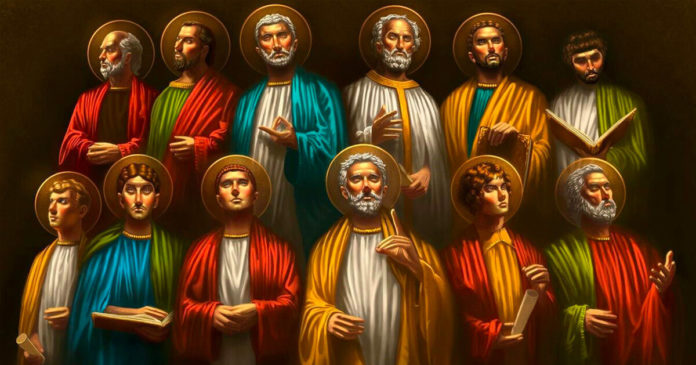How can all the saints listen all people on earth all the time? Protestants object to invoking the saints in prayer for a good reason. That they feel that this practice obscures the mediation of Christ. Contrary to this Protestant objection, the Catholic Church teaches that the prayers of Saints in Heaven are mediated to God the Father through Jesus Christ. Christ is the one mediator between God and man, whether those men are in heaven or on earth.
The Catholic asks a saint in heaven to prayer for him just as he might ask a friend for prayer. There is however a big difference between asking my wife to pray for me and asking St. Paul to pray for me.
For example, my wife is standing in the room and can hear me say, “Sweetie, please pray that I prepare my lecture in time for tomorrow’s class.” If I were to ask the same “prayer request” from Saint Paul, it is obvious that he is not standing in the room with corporal ears ready to receive my vocal request.
How then does this prayer get transmitted to Saint Paul?
And what if there are 2,000 people all asking for Saint Paul’s prayers at the same time?
Some Protestants assume that Catholics believe that the Saints are omniscient and/or omnipotent. The Catholic Church does NOT teach that the Saints in heaven are omniscient (all knowning) and/or omnipotent (all powerful). So if they are not omniscient how do they “hear” these prayer requests coming from earth?
The answer is the Holy Spirit. St. Augustine taught that just as the Church is the body of Christ, so the Holy Spirit is the “soul of the Church.”
What the soul is in our body, that is the Holy Ghost in Christ’s body, the Church” (Sermon 267, 4: PL 38, 1231 D).
The soul’s presence in the human body is what allows messages to move through the body. The brain can cause the toes to wiggle or the eye to wink. But this can never happen in a dead body. The soul is what allows messages to travel through the body. If you take away the soul, the brain cannot ask the toes to wiggle and stomach cannot ask the hands and mouth to feed it.
So it is in the communion of saints. The Holy Spirit allows the central nervous system of the Body of Christ to send messages back and forth from one another. The Holy Spirit is He who gives the Saints their status as “holy ones.” To be a bit more theological, the saints in Heaven have access to the beatific vision of God’s Essence, there the saints are able to participate in God’s knowledge.
Let me anticipate two objections:
1) If what you say is true and the Holy Spirit transmits “prayer requests” from us to other Christians in heaven, why can’t I send a prayer request by telepathy to a Christian living in China?
2) If what you say is true and the Holy Spirit transmits “prayer requests” from us to Christians in heaven, then why can’t they send us personal messages in return?
The first objection is answered on account of “time and space.” If we are separated by time and space from another person, we cannot communicate. (This is not entirely true in an age of cell phones and email.) The glorified Saint is not in time or space. This is a mystery. So he or she can somehow hear a million prayers “at one time” through the Holy Spirit who is infinite.
The second objection is answered by recognizing that the Saints sometimes do “send messages” to the faithful on earth. For example St. Gregory of Nyssa explains that St. Gregory the Illuminator received a vision in which:
“he heard the one who had appeared in womanly form exhorting John the Evangelist to explain to the young man the mystery of the true faith. John, in his turn, declared that he was completely willing to please the Mother of the Lord even in this matter and that this was the one thing closest to his heart. And so the discussion coming to a close, and after they had made it quite clear and precise for him, the two disappeared from his sight.” (St. Gregory of Nyssa, Life of St. Gregory the Wonderworker)
Here we have a pre–Constantinian example of the Blessed Virgin and St. John the Apostle appearing to someone earth with a message. The history of the Church is full of such examples.
One last objection. But isn’t praying to dead people the sin of necromancy?
Technically, necromancy is consulting the dead in order to discern the future. The word necromancy derives from the νεκρός (nekrós), “dead”, and μαντεία (manteía), “divination”. First, the Saints in heaven are not “dead.” They are alive in Christ – more alive than we are! “He is notGod of the dead, but of the living; you are quite wrong” (Mark 12:27). Secondly, Catholics do not ask the Saints for prayer so that they can forecast the future. Maybe somebody’s aunt in Mexico conjures up things through burning herbs and invoking saints – but that is not what the Catholic Church teaches or promotes. It’s an abuse, not the norm.
Ultimately, glorified Saints in heaven take up their priestly identity as the people of God. This priestly identity involves intercession and so they continue to love us and the only thing they can do is pray for us. “We are surrounded by so great a cloud of witnesses” (Hebrews 12:1).
All Saints, pray for us!
By Dr Taylor Marshall

